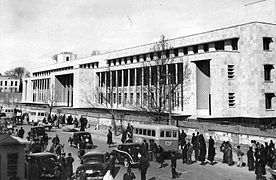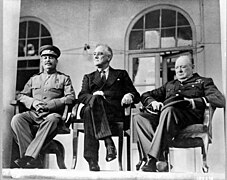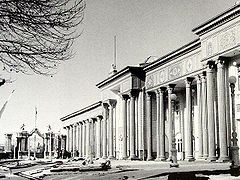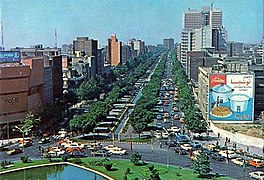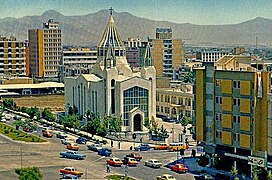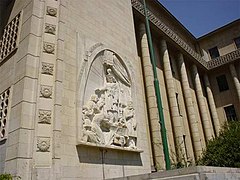
Tehran
Tehran (/tɛəˈræn, -ˈrɑːn, ˌteɪ-/; Persian: تهران Tehrân [tehˈɾɒːn] ⓘ) is the capital and largest city of Iran and also the largest city in Tehran Province. It also serves as the capital of the province, county and the Central District.[6] With a population of around 9 million and 400 thousand in the city and around 16 million and 800 thousand in the larger metropolitan area of Greater Tehran, The Greater Tehran metropolitan area contains towns like the "New Town of Andisheh", "Islam Shahr", "Shahreh Qods", "Shahryar", "Pakdasht", "Firooz Kooh" and "Shamiran". Tehran is the most populous city in Iran and Western Asia,[7] and has the second-largest metropolitan area in the Middle East, after Cairo. It is ranked 24th in the world by metropolitan area population.
This article is about the Iranian capital city. For other uses, see Tehran (disambiguation).
In the classical antiquity, part of the territory of present-day Tehran was occupied by Rhages (now Ray), a prominent Median city[8] destroyed in the medieval Arab, Turkic, and Mongol invasions. Modern Ray was absorbed into the metropolitan area of Greater Tehran.
Tehran was first chosen as the capital of Iran by Agha Mohammad Khan of the Qajar dynasty in 1786, because of its proximity to Iran's territories in the Caucasus, then separated from Iran in the Russo-Iranian Wars, to avoid the vying factions of the previously ruling Iranian dynasties. The capital has been moved several times throughout history, however, and Tehran became the 32nd capital of Persia. Large-scale construction works began in the 1920s, and Tehran became a destination for mass migrations from all over Iran since the 20th century.[9]
Tehran is home to many historical sites, including the royal complexes of Golestan, Sa'dabad, and Niavaran, where the last two dynasties of the former Imperial State of Iran were seated. Tehran's landmarks include the Azadi Tower, a memorial built under the reign of Mohammad Reza Shah of the Pahlavi dynasty in 1971 to mark the 2,500th anniversary of the Persian Empire, the Milad Tower, the world's sixth-tallest self-supporting tower, completed in 2007, and the Tabiat Bridge, completed in 2014.[10]
Most of the population are Persian,[11][12] with roughly 99% of them speaking the Persian language, alongside other ethnolinguistic groups in the city which became Persianized and assimilated.[13]
Tehran is served by Imam Khomeini International Airport, alongside the domestic Mehrabad Airport, a central railway station, Tehran Metro, a bus rapid transit system, trolleybuses, and a large network of highways.
Plans to relocate the capital from Tehran to another area due to air pollution and earthquakes have not been approved so far. A 2016 survey of 230 cities across the globe by Mercer ranked Tehran 203rd for quality of life.[14] According to the Global Destinations Cities Index in 2016, Tehran is among the top ten fastest growing destinations.[15] Tehran City Council declared October 6 the Tehran Day in 2016, celebrating the date when in 1907 the city officially became the capital of Iran.[16]



